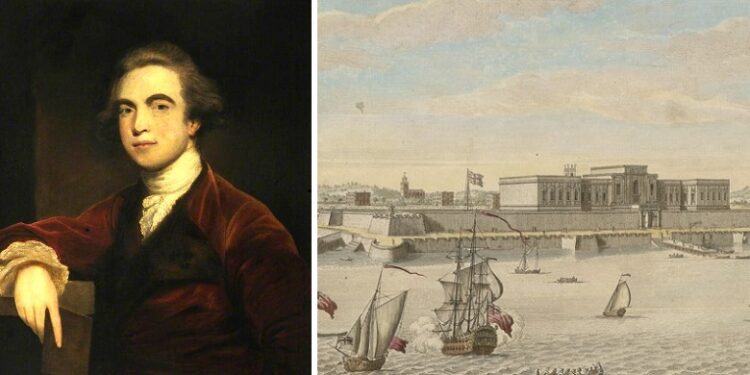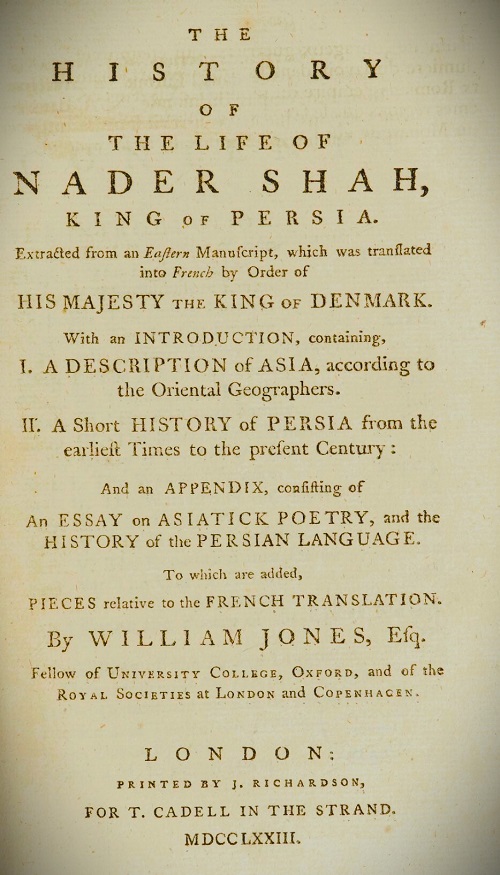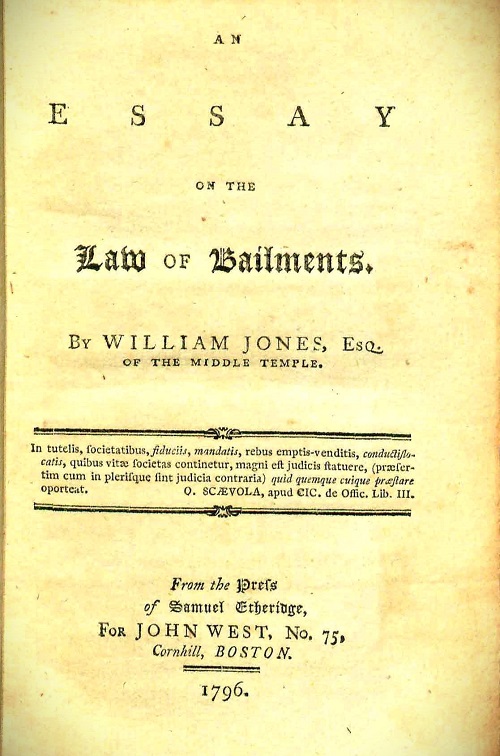
Born on 28 September 1746, William Jones founded the Asiatic Society of Bengal on 15 January 1784
By Zaffar Junejo
Some argumentative readers may question the topic of this article. Frankly speaking, Sir William Jones was not my first choice. I wanted to write about early archaeologists who worked in the British India, and then move to the post-partition Pakistan. But when I took a deep dive into Sir William’s life and works, I was deeply influenced, and I changed my original plan. I fell in love with this brilliant man of the British Empire as I explored more about him and his contribution.
Every other document highlighted his role, and that of the Asiatic Society of Bengal, in creating Indology as a new discipline. There is no doubt that he was the one who set the ground for systematic disciplines of archaeology, history and linguistic studies in India. With such credentials, it is extremely difficult to ignore his intellectual persona in any narrative that looks at ancient South Asian history. It is indeed not possible to cover Sir William’s work in a single article, like this one. I have, however, endeavored to cover his major contributions in the following three sections that cover his life, education and work in England and India.
William Jones was born on 28 September 1746. According to Welsh tradition, he took the Christian name of his father (William) and his surname Jones. His father died when he was only three years old. He attended Harrow School where he proved himself a promising student in classical scholarship and oriental languages.
In 1764, he entered University College, Oxford, where he advanced in Greek and Hebrew languages and learned more about Middle Eastern Studies, Oriental literature, and philosophy. Apart from these, he also acquired mastery over the Chinese, Portuguese and Spanish languages. At Oxford, he continued his study through the assistance of a college scholarship and earnings from tutoring. He completed his Bachelor of Arts degree in 1768 but before that he was already famous as an orientalist.

In those days, King Christian VII of Denmark visited England, and William Jones was approached to translate Mirza Mehdi Khan Astarabadi’s biography of Nader Shah from Persian to French. The proposed task was difficult, but he accepted it. At one point, he halted his studies for one year just to finish the translation. Eventually, the translated book came out with the French title Histoire de Nader Chah in 1770. The publication played its part in establishing him as a translator and language scholar. He authored another book, A Grammar of the Persian Language, in 1771, which proved to be one of the best grammar books on the Persian language in English. He wrote some other books, including Poeseos Asiaticae Commentariorum (1774) which included translations of Arabic and Persian poetry. These books got him nicknames such as “Oriental Jones,” “Persian Jones” and “Linguist Jones.” In the meantime, he thought about a poetry book with the title of Britain Discovered, but he focused more on translating from Asiatic languages.
William Jones was awarded his Master’s degree in 1773 and called to the bar a year later. In his law-practicing days, he always longed to acquire the style and graceful attitude of Marcus Tullius Cicero, the multi-talented Roman lawyer, philosopher, skeptic and statesman. Therefore, he shaped his disarrayed ideas, and focused on himself according to that adopted model. He also came up with a detailed plan which he called “Andrometer” – its rough translation could be “man measure.” The ingredients of the plan were: thirty years for career preparation, and the next twenty years for professional training and public service. Afterwards, one’s years ought to be reserved for literary contribution and other pursuits, and then move towards lifetime devotion, “preparation for eternity.” He got some success in the legal practice, and his legal reputation was accepted in 1776 when he was appointed Commissioner of Bankruptcy. It was a minor position, but it brought him around a hundred pounds a year.

In the middle of that time, he undertook another project: the English translation of Isaeus’s speeches about the Athenian right of inheritance, which he published in 1779. The translation from Greek to English established him as a leading lawyer and legal scholar. It was a single book that proved that his skills were universal, and easily adapted to any field or subject of his interest. He also wrote his famous Essay on the Law of Bailments in 1781. Readers believed that it was an outcome of his legal studies and notes. It was considered the first systematic and scholarly treatment of English law. The concluding part of the book exposed readers to the history of English law, the author’s analysis and a synthesis.
In his legal career, he had a tendency towards upholding social justice. Therefore, he sacrificed a lot of opportunities, or he was stopped from availing them. However, he continuously wrote, and in a record time of three years (from 1780 to 1783) authored a good number of books. Popularity came to An Inquiry into Legal Mode of Suppressing Riots with a Constitutional Plan of Future Defence (1780), which was written in the context of the Gordon Riots. In those riots, London was at the mercy of mobs for five days, and finally the army was called to calm the city. Another book A Speech on the Nomination of Candidates to Represent the Country of Middlesex (1780) was written in the background of general elections. In the book, he criticized the King, highlighted the exploitation of India, pointed to unrest in the colonies (America) and condemned the African slave trade. Another pamphlet which also became famous was The Principles of Government in a Dialogue between a Scholar and a Peasant (1782). It exposed the oppression at home and advocated the new philosophies of equality and general good.

He anonymously published a forty-page letter entitled A Letter to a Patriot Senator including the Heads of a Bill for Constitutional Representation of the People (1783). This one, like previous books, also had a backstory. A parliament member sought William Jones’ views on constitutional representation, and the response came out in the form of a pamphlet. It attacked the system and exposed that only wealthy men go regularly to parliament, whereas the British constitution allows all subjects to vote except in the cases of extreme mental incapacity. The author argued that the only solution would be to have annual elections with more parliamentary representative for the common people.
Alongside all these political writings, he also wrote political poems. Most of them were in support of the American Revolution. Therefore, there was a rumour in London that Jones would move to the United States of America to help new nation in writing the constitution. William Jones was, however, aspiring to something different: a change in Government. Finally, Lord North’s Government was defeated, and the Marquess of Rockingham became the Prime Minister of Britain a second time (he remained in office from 27 March to 01 July 1782). Now, William Jones’ friends were in power, but they were divided, and before them important questions were to be settled. These were: the question of Ireland, the future of America and commercial as well as political interests in India. On the other hand, he explored all opportunities, and approached all his friends to get the position of a judge at the Supreme Court Judicature at Fort William, Calcutta (also known as the Supreme Court of Bengal). But there was no hope, so he thought about migrating to America, or to continue his law practice at London or to settle in Oxford and live a retired life along with Anna Maria. But none of those options had any guaranteed income stream that was required to help him live in his preferred lifestyle and pursue intellectual dreams.
In the mid of the crisis, he again approached Shelburne, who was now the Prime Minster after the sudden death of Lord Rockingham. Finally, after a wait of five years, the good news came. Shelburne kept his promise and got the King’s approval to appoint William Jones as the judge of the Supreme Court of Bengal. This was made public by the London Gazette on 03 March 1783. Garland Cannon in his book Oriental Jones, a Biography of Sir William Jones (1746-1774) has commented on the appointment: “Upon his [William Jones’] shoulders rested a larger issue – could the Oriental peoples learn to love and trust the West? In colonial 1783, non-political Jones was on his way to Bengal to seek out the answer.” (Continues)
_______________________
 Dr. Zaffar Junejo is Research Scholar, Department of History University of Malaya, Malaysia. Mr. Junejo apart from scholarly contribution also writes for popular media. He could be accessed at: Email junejozi@gmail.com, Cell/WhatsApp +92 334 045 5333 Skype Zaffar.Junejo Facebook facebook.com/zaffar.junejo
Dr. Zaffar Junejo is Research Scholar, Department of History University of Malaya, Malaysia. Mr. Junejo apart from scholarly contribution also writes for popular media. He could be accessed at: Email junejozi@gmail.com, Cell/WhatsApp +92 334 045 5333 Skype Zaffar.Junejo Facebook facebook.com/zaffar.junejo
Courtesy: The Friday Times Naya Daur Lahore (Published on January 15, 2023)